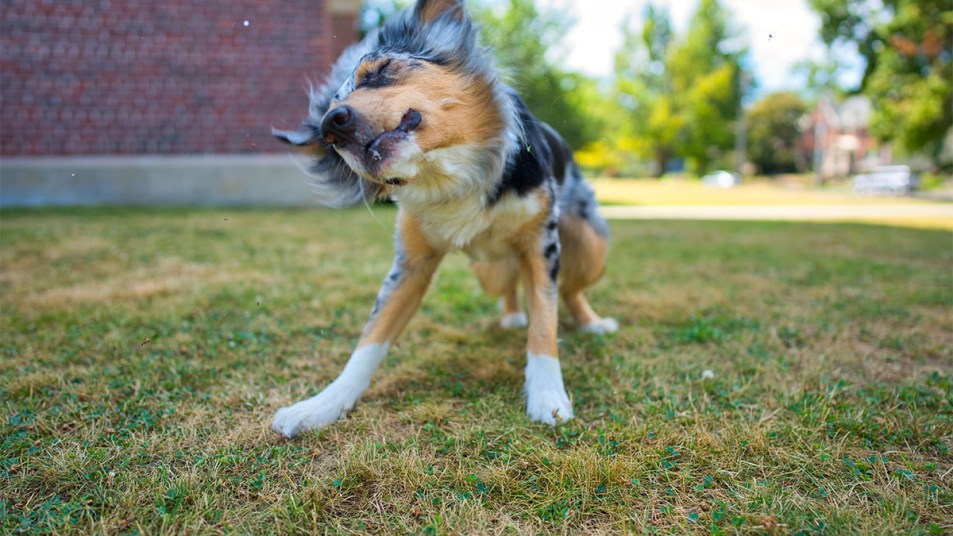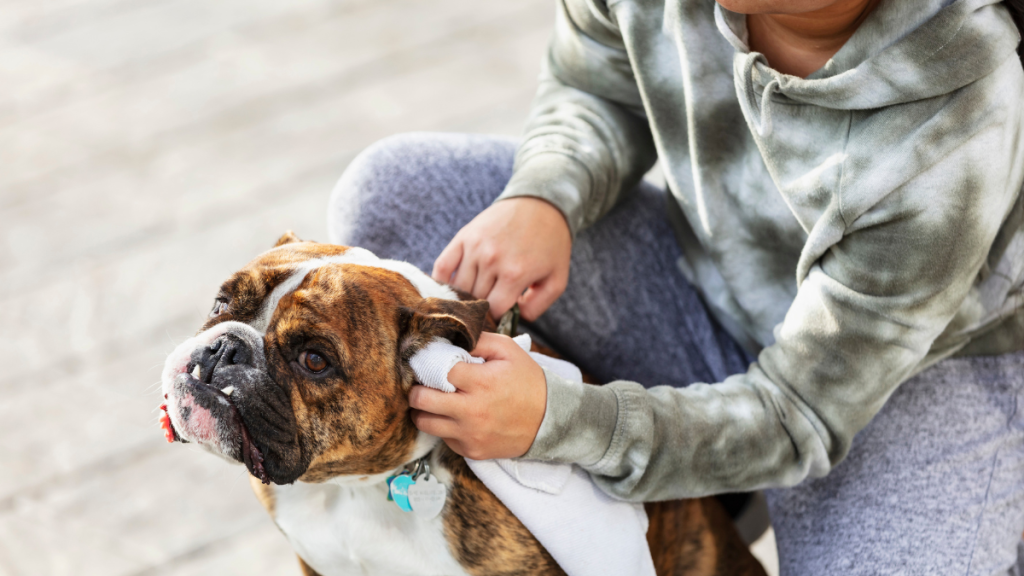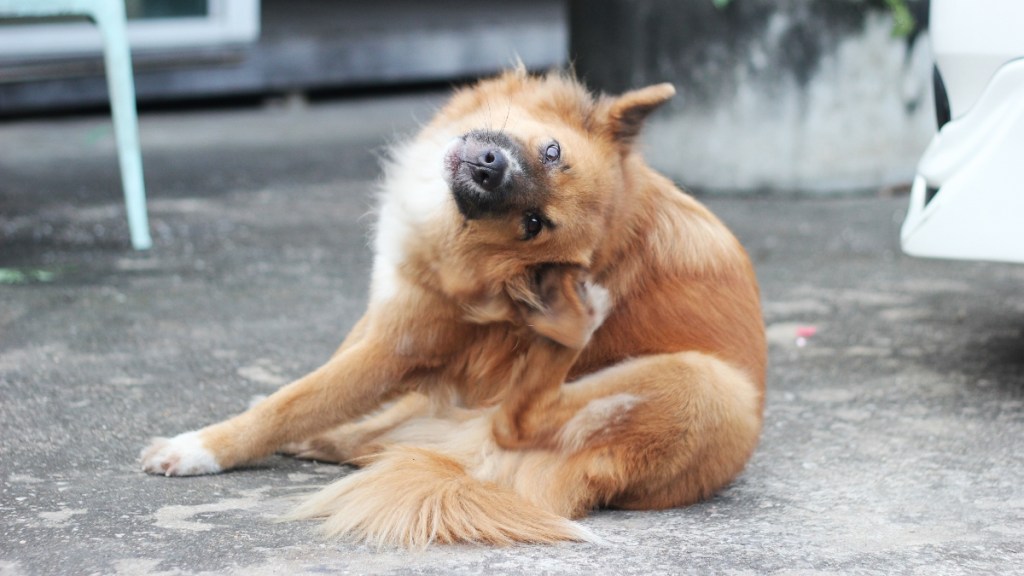Why Does My Dog Keep Shaking His Head? Potential Causes and Easy, Effective Fixes
Discover the answer without a costly visit to the vet.

Your sweet pup might shake his head in the midst of playing, or right after a bath, or even after a romp or roll around in the backyard or at the dog park. While head shaking is a pretty common behavior in dogs, you may see your pal doing it at other random times, or notice that he’s doing it pretty often. You might wonder if that’s normal as well. To get some answers we turned to a veterinarian to ask the question “Why does my dog keep shaking his head?” Read on to find out the many reasons why Rover might be doing this.
Why does my dog keep shaking his head?
As it turns out, excessive or intense shaking can be caused by quite a few things. “There could be a variety of reasons why your dog keeps shaking their head,” says Courtnye Jackson, DVM, veterinarian and co-founder of ThePetsDigest.com. “Some of which can be nothing at all, while other times the head shaking could be caused by a serious health condition.” So how can you tell if it’s nothing serious or if you should be taking your buddy to the vet? Here, Dr. Jackson covers the most common reasons for the question “Why does my dog keep shaking his head?” and how to respond to them.
1. Ear infection
The most likely reason your pal may shake his head is probably because he has an ear infection. “Ear infections can occur in any dog,” says Dr. Jackson. “However, they are much more common in dogs with long floppy ears.” That is dogs like Basset Hounds, Spaniels, Beagles and more. Besides the head shaking and scratching, another big indicator of an ear infection in dogs is often the smell: There will be a ‘yeasty’ odor coming from the ear, which is caused by the infection-causing yeast present in the ear canal. This yeast thrives in a moist, warm environment, which makes your pal’s ear the perfect spot to host them.
What can you do about recurring ear infections?

If you can smell a beer or bread-like odor coming from your pup’s ear, or if he has recurring ear infections, there are a couple of things you can do to help keep these infection-causing yeast at bay. They include:
Ensuring the ears are dry: Especially after baths, being in the rain or a swim in the pool or lake, it’s important to dry out your dog’s ears. “Use cotton balls to wipe away any moisture around the ear,” advises Dr. Jackson. “You could even place a few balls in the ear before a bath for added endurance.” Just be sure to remember how many balls you stuffed in your buddy’s ears to ensure you remove them all.
Clean ears weekly: Gently wiping out your cuddle bug’s ears once a week with a few cotton balls and an ear cleaner solution meant for dogs can fend off the yeast that leads to infections. One to try: Vet Classics Ear Wash. To do: Squeeze a few drops of the solution into your favorite canine’s ear canal. Next, massage the base of the canal to work the solution around the ear for a minute. Then use a cotton ball to wipe off any excess. But be careful not to stick the cotton ball too deep into your buddy’s ear canal, since that could cause an injury or push debris further into the ear.
Prevent excessive ear licking: If you have more than one dog, you may notice that one particular pup enjoys giving the other a good ear lick. If any of your pups have frequent ear infections, you’ll want to nip this behavior in the bud since this action can also lead to moisture in the ear. “Pet owners with more than one pet should keep an eye on this,” says Dr. Jackson. “They want to be sure the second dog is not contributing to ear infections by licking the other dog’s ears.” Redirect this behavior by offering the ear-licker a treat or favorite toy anytime you see him starting to lick.
2. Why does my dog keep shaking his head? Foreign object
Another common reason for sudden, excessive head-shaking is that your little rascal might have something inside of his ear. “Dogs may use head shaking as an effective way to expel irritants from their ears,” says Dr. Jackson. Debris might have settled in the ear after rolling around outside, for example. If you can see a blade of grass sticking out of your pal’s ear, you can remove it. However, if you see something wedged down deeper, call the vet. Trying to pull something out of your dog’s ear might actually cause it to go deeper, which can lead to injury and infection.
3. Insect irritation
Another answer to the question “Why does my dog keep shaking his head,” especially in the summer, might be a bug bite or other irritation caused by insects on or in the ear. “Many times dogs that are outside a lot may have flies that bother their ears and some even bite,” says Dr. Jackson. “This is called fly strike dermatitis.” This can lead to open sores on and around your pup’s ears. However, other critters like ticks, mosquitoes and ear mites can cause issues as well.
Fly bites: “In the case of fly strike dermatitis dog owners can apply petroleum jelly to the tips of the ears and make sure to keep the ears clean and free of debris,” says Dr. Jackson. You will also want to treat any open wounds the flies or scratching may cause. “It is also a good idea to keep your dog inside where flies can not get to the ears,” she adds. “This will give ears a chance to heal and stave off infections.”
Ticks: These pesky critters like to congregate in your sweetpea’s ears, since it is a warm and protected area where they can easily hide. “The first step to prevent tick irritation in the ears is to ensure your dog is on an effective flea and tick prevention,” says Dr. Jackson. Additionally, when removing ticks, she says to be sure you get all of the parts of the tick out of the skin. “Sometimes the head or other mouthparts are left in the skin if a tick is not removed properly, which can lead to infection,” says Dr. Jackson. “So you should double-check to ensure there is not any visible part of the tick left in the ear.” In the case of a tick that is deeply attached in the ear, or if you see parts of the tick still intact in the ear canal, it’s best to schedule a vet visit to have it removed.
Ear mites: While ear mites are more common in cats, sometimes mites can be a problem for dogs. If mites are present, you’ll notice the tell-tale discharge that resembles coffee grounds. “If a pet owner has their dog on a flea and tick prevention that secondarily treats mites,” says Dr. Jackson. Otherwise, if you notice mites, the best plan of action is to schedule a visit to the vet’s office for medication.
4. Why does my dog keep shaking his head? Allergies
Food-related allergies can cause redness and swelling in your pal’s ears. Even if your good buddy has been on the same diet for years, allergies can still pop up due to ingredients in food like dairy, beef, chicken, eggs and more. “Allergies can affect the ears through secondary ear infections and itchiness,” says Dr. Jackson. This can cause your four-legged bestie to scratch at his ears, which irritates them, making the problem worse.
To check if it’s allergies: According to Dr. Jackson, a simple way to rule out if your dog is having ear issues due to allergies is to do a rudimentary food trial. “Try changing the main protein source in their diet and treats,” she advises. “Switch from their regular food to one that provides a novel protein like bison, venison or salmon.” However, if the problem doesn’t clear up after switching dog foods, it might be time to take your pal to the vet.
When should you worry?

If you’ve attempted to treat any of the problems listed above but your pal’s head-shaking continues or worsens, then it’s time to let the vet take a peak, since your little rascal most likely will need medication. Also, in rare cases some dogs may shake their head due to a tumor being present in their ears. “Although rare, I did see a case like this recently,” says Dr. Jackson. “This condition can cause head shaking, especially if the tumor is on the tip of the ear.” Sometimes tumors might not be visible.
Another rare cause of head-shaking may be due to neurological issues. “While this reason isn’t as common, dogs can have head tremors and they are often idiopathic, which means of an unknown source,” says Dr. Jackson. “However, many times these movements are different from ear infection movements as the tremors can be up and down or side to side as well.” A veterinarian will help get to the root of the problem and create a treatment plan to help your pal.
If you can’t get in for a vet visit anytime soon, or even if he is on a treatment plan and it needs some time to take effect, Dr. Jackson advises buying an ear wrap to help prevent ear hematomas from forming. “A hematoma is blood accumulation under the skin,” she explains. “Most dogs get them in the ear when they are shaking their heads and hitting the ear against their heads, this causes small ruptures and subsequent blood pooling within the ear.” If left untreated it can cause more harm and disfigure the ear. One to try: Happy Hoodie Calming Cap for Dogs.
Click through for more ways to ensure your furry friend is happy and healthy!
Experts Share The Real Reasons Your Dog Has Dandruff + How to Treat It Naturally
Surprising Causes of Your Dog’s Bad Breath + Vet-Approved Ways to Get Rid of It Fast
Out of Dog Shampoo? A Vet Explains Why You Should Never Use People Shampoo + What To Use Instead


















